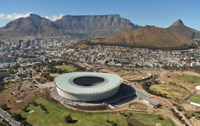
The campaign, introduced at the Cape Town Tourism's Annual General Meeting on Monday 17 October at the Cape Town International Convention Centre, encapsulates the essence of every facet of what the City has to offer, from tourism to design, business and studies to the rich diversity of people and nature.
CEO of Cape Town Tourism, Mariëtte du Toit-Helmbold, says, "Global best practice shows that the demand problem will be addressed if we retain most of our existing successful initiatives but overlay them on a compelling global marketing and communications campaign, which takes the city to the world in a bold and comprehensive manner.
"Such a strategy would position Cape Town as a city of the future, for the benefit of all visitors irrespective of purpose of visit, building the knowledge base and subsequently demand. Whilst we acknowledge that Cape Town is still plagued with serious social issues, we must illustrate the determination to resolve these issues via tourism, education, service delivery, city planning and design."
From 2008, this brand positioning has been formulated in partnership with tourism members, the private sector, the City of Cape Town, non-member role players and key stakeholders such as Accelerate Cape Town, the Cape Film Commission and the newly formed EDP (Economic Development Programme).
People are seeking to 'put the joy back into living and travelling' and the new tagline speaks to this - "You don't need a holiday, you need Cape Town!"
The marketing and communications campaign focuses on three key areas:
The plan and campaign is designed to complement the city and region's broader economic strategy and brand and align with the mandate of the soon to be established EDP.

Negotiations with Discovery Channel and National Geographic have been concluded and Cape Town Tourism will launch a series of programmes with these media partners in April 2012. A series of programmes have been agreed in collaboration with Durban, Johannesburg and South African Tourism and will showcase the liveability of the cities, generating a greater demand for South Africa amongst the world's urban travellers.
The programmes will be screened in all key traditional and new markets over a nine-month period and will be amplified with vignettes, advertising, promotions on television, digital and online platforms, in-market events (like photo galleries and retail displays) and print articles, as part of a comprehensive through-the-line campaign with these partners.
Discovery Channel has also agreed to conduct a film school in Cape Town, which will provide skills and knowledge to attendees whilst generating footage for use by Discovery, Cape Town Tourism and the Cape Film Commission.
In terms of domestic tourism, Cape Town Tourism will continue to position Cape Town as a unique, inspiring and great value year-round destination for local travellers, especially in off-peak periods.
Part of its domestic strategy is to leverage events as part of a national marketing campaign. This entails using established events such as the Cape Town International Jazz Festival, the J&B Met, new lifestyle events in winter and partnering with low-cost carriers and the local tourism industry to offer great value short city break packages. The focus will remain on winter to help address seasonality whilst growing domestic tourism.
The third key element of the strategy revolves around more authentic and interactive visitor experiences in the destination. An example includes the Fan Walk developed for the 2010 FIFA World Cup and using it to link sites of significance across the city through a series of interactive walks, redeveloping it into Cape Town's Freedom Walk.
Another initiative is working with events such as the Cape Town Festival of Beer to develop and market new themed routes, tours and experiences for the city and surrounding regions. Not only will this result in a wider dispersion of visitors across the city and beyond, providing new and authentic experiences for visitors, it will also spread the tourism spend and create new business opportunities such as trading, street performers and public concerts.
Du Toit-Helmbold concludes, "The marketing campaign is about more than just attracting tourists. It's about incorporating business and investment, the creative and innovation sectors and academia into one vision and direction - economic growth, job creation and inclusion to the benefit of all citizens."
For the full speech, go to www.capetown.travel/media/press-releases/entry/annual_general_meeting_2011_ceo_speech_/.